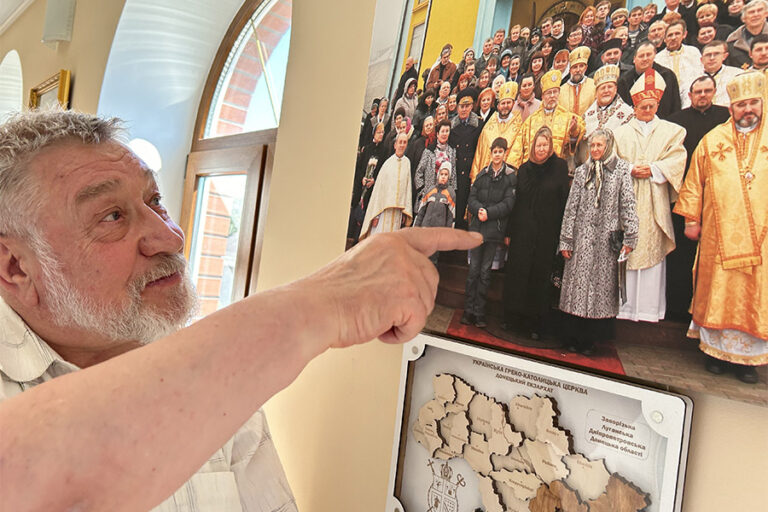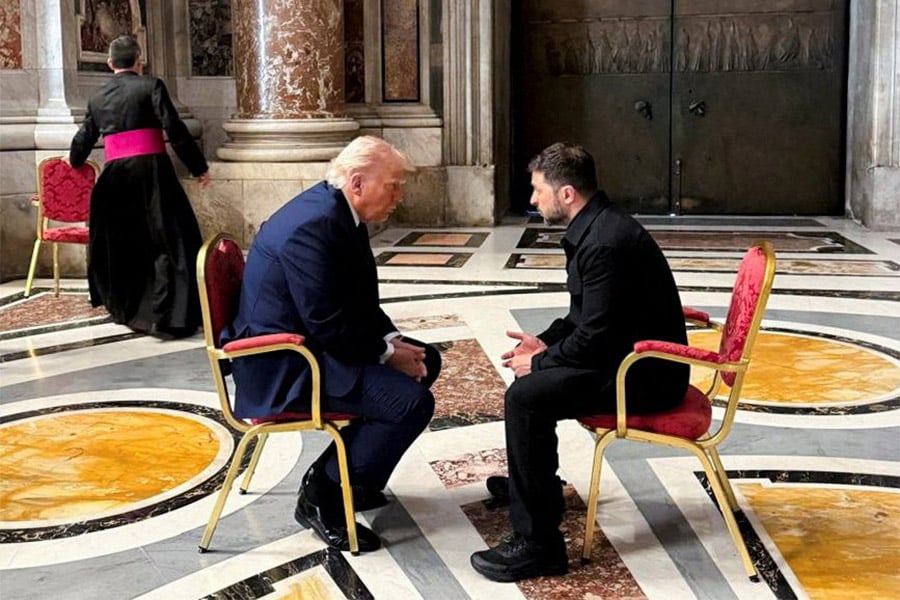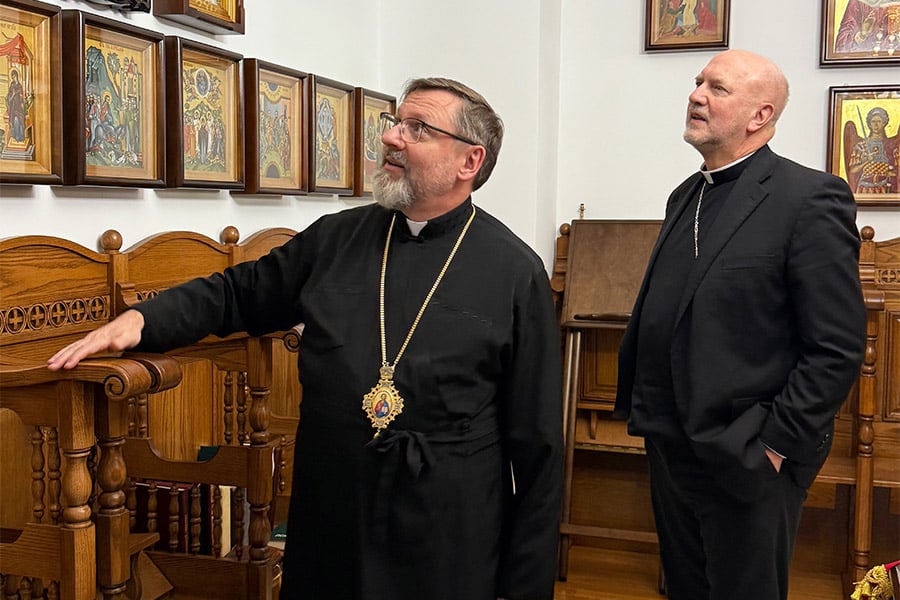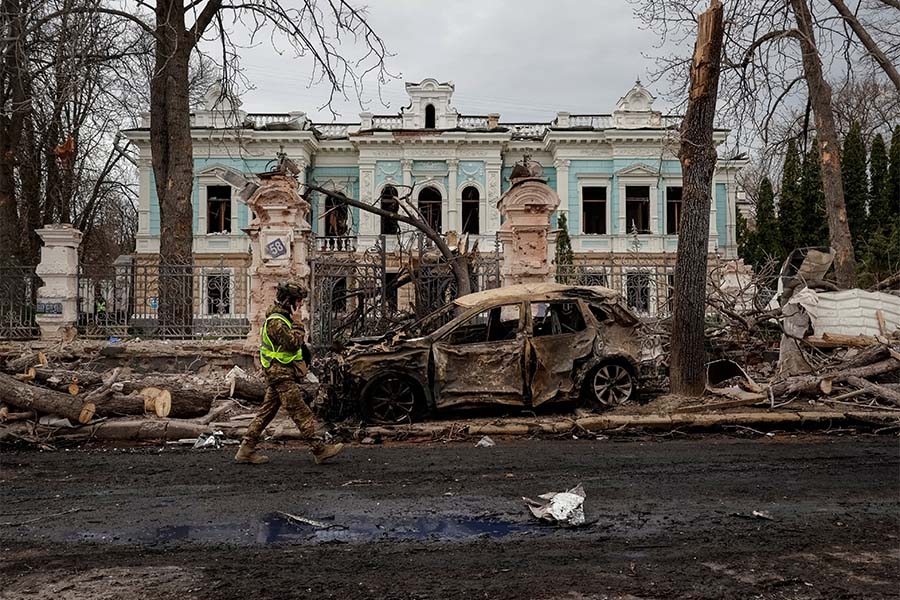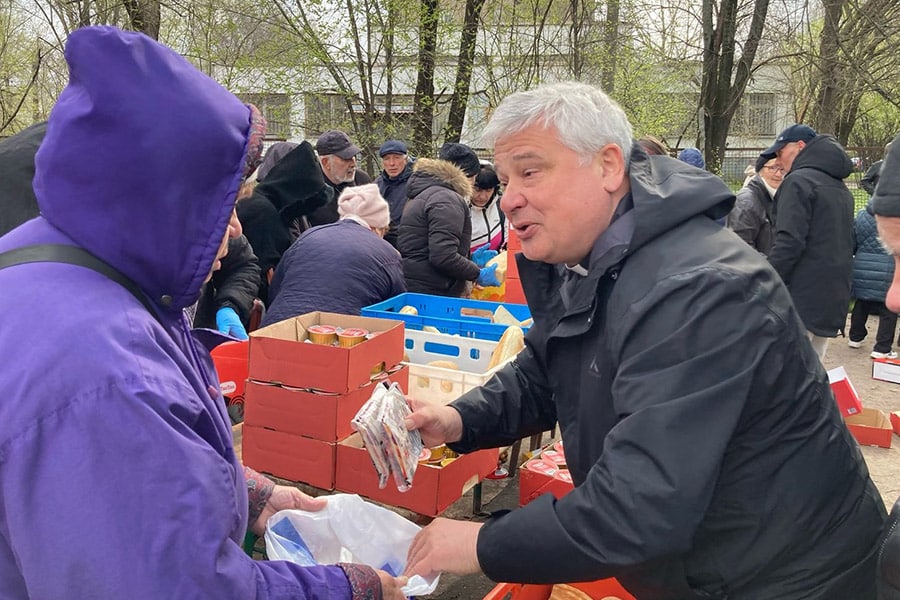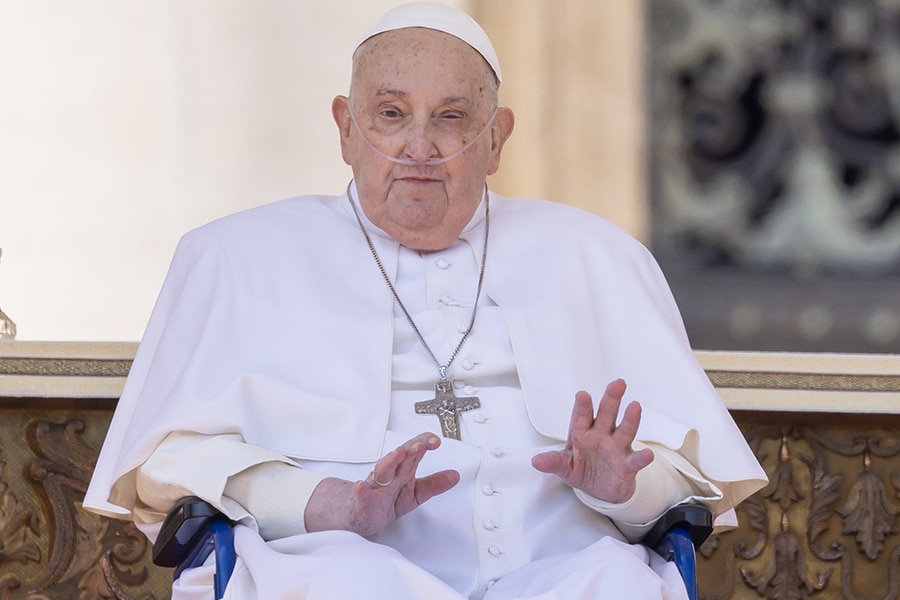ZAPORIZHZHIA, Ukraine (OSV News) — During a September visit to Ukraine, OSV News sat down with Bishop Stepan Meniok, a Redemptorist and bishop of the Ukrainian Greek Catholic Church’s Donetsk Exarchate. Since Russia’s 2014 invasion of Ukraine’s Donetsk, Luhansk and Crimea regions, Bishop Meniok has been exiled from his exarchate, and lives in the city of Zaporizhzhia, which remains under Ukrainian control.
This interview has been edited for clarity and length.
OSV News: You grew up in Soviet Ukraine, at a time when the Ukrainian Greek Catholic Church had been officially banned and its activities were conducted “underground” — that is, in secret by the faithful. How did you come to discern both your faith and your vocation?
Bishop Meniok: A friend introduced me to the rosary (while I was a young man). I asked my friend where he got it, and he told me he’d learned about the rosary from a priest who had been jailed for his faith.
Through my friend, I met that priest in an apartment that was (part of) the underground church network. He was a funny guy, and I liked his jokes. … He had been in jail four times for his faith in God. His fourth trial was for teaching kids the catechism and how to pray.
The second thing I liked about him was his poverty; I was really struck by that. He only had one jacket, and his sleeves were totally tattered, as you might see in someone who was destitute. Yet he was a priest. And when he lifted his arms in prayer to say the Our Father, I would see all those threads from his worn jacket.
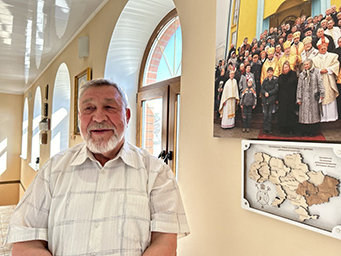
I was studying at the polytechnic university (at the time), and I was just drawn to him. The youth would come to him. And of course young people are always hungry, so someone would say, “Oh, please, I would like to eat something,” and he would cook. He had some kasha, but no oil or butter to season it; only the means to make it warm. So he would add water and heat it up, and we ate it all because we were hungry.
And I would ask him, “Father, what will you eat tomorrow, since we ate everything just now?” He would answer, “Don’t worry about it; I’ll take care of it.”
He also told us, “You will all become priests.”
And I said, “I’ll never be a priest.” I had a girlfriend whom I wanted to marry. I had an inner struggle (with my vocation). But that changed when all my friends went to seminary, and I eventually joined them.
I was ordained (as a Redemptorist priest) in the underground church in 1984. I was never afraid (of persecution for my faith). Why should I be afraid?
OSV News: When did Russia’s post-communist persecution of the Ukraine Greek Catholic Church begin in the Donetsk region of Ukraine, which — as a historically Orthodox area — has been a missionary territory for the UGCC?
Bishop Meniok: I was made bishop of the Donetsk Exarchate in 2002, and the persecution started in 2014. Until 2014, we developed really normally. We had close to 60 parishes and 50 priests, over eight oblasts (regions). The Donetsk Exarchate is a huge territory, covering a third of Ukraine.
In 2014, I went to Zarvanytsia (a major Marian pilgrimage site in western Ukraine, home to a basilica and an icon of Mary that has twice received papal crowns). When I was coming back, somebody told me that my house was occupied — he said there were “guests” in my house.
They were Russian soldiers, although back then they never admitted they were. (In its 2014 invasion of Ukraine’s Crimea, Donetsk and Luhansk regions, Russia initially deployed forces without insignia, then later admitted the forces were Russian. — Ed.)
I had nothing with me; not even my cassock. All of my vestments, books — everything was still there. Only one nun was there, a Slovakian who was a Sister Servant of Mary Immaculate. They gave her three days to leave, because they had to do some sort of “investigation” in my house.
OSV News: Were you afraid?
Bishop Meniok: To be afraid never entered my mind. I wanted to go (back) to Donetsk and everybody was asking me, “Are you not afraid?” I wasn’t afraid to be killed.
OSV News: What happened to your parishioners who were left behind in Donetsk?
Bishop Meniok: We had four priests in Donetsk, and they stayed during the occupation. They were celebrating liturgies until 2019. I also kept in touch with people by phone.
In November 2022, two (Redemptorist) priests in Berdyansk, Father Ivan (Levytskyi) and Father Bohdan (Heleta) were arrested. (The two were released in late June 2024, after 18 months of captivity and torture. — Ed.)
Then all the priests left (the exarchate territory). Two were not able to cross the border because of the location of the front line, and ended up having to go through Russia (to re-enter Ukraine). They were in a filtration camp (a Russian detention center where Ukrainians are frequently interrogated and tortured) for two weeks. Fortunately, they were not tortured; just detained. But there’s still great anxiety, because you know nothing about your fate. The Russians knew they were priests.
One of the priests is from Donetsk. His mom stayed there, and now he’s in Kyiv but wants to come back. However, His Beatitude (Major Archbishop Sviatoslav Shevchuk, head of the UGCC) doesn’t allow him to do so for safety reasons.
OSV News: Recently, Major Archbishop Shevchuk stated that there are now no UGCC priests in the territory of the Donetsk Exarchate. Is that still the case?
Bishop Meniok: Yes. On the Russian-occupied territories of Ukraine, there are no Greek Catholic priests present.
In Berdyansk, they were arrested.
In Melitopol, they were expelled and beaten.
And in Severodonetsk, Lysychansk, Luhansk — they were forced to leave.
OSV News: What happened to your church buildings under Russian occupation?
Bishop Meniok: The cathedral (the Church of the Protection of the Mother of God) is just closed; nothing is in there. I don’t really know what happened in Severodonetsk. In Lysychansk the church was already completed, but somebody put a red flag (similar to that of the Soviet Union) there.
OSV News: Why do you think the Russians are persecuting the UGCC?
Bishop Meniok: They are afraid of the same thing as the KGB (the Soviet Union’s intelligence service) was afraid of — Ukrainian identity. They are afraid of Ukrainian identity, the Ukrainian language. They know that UGCC priests help and educate people.
Some people in the east of Ukraine do not speak Ukrainian (but Russian), and they would come to our parish. Even I didn’t know why they were drawn to us, why they liked us. And they said, “Your priests are good.”
I wanted to celebrate liturgy in Russian for them and I did so for a month, until they said, “No, no, do it in Ukrainian.”
Sometimes the Russian speakers and the Ukrainians would argue, and I would say, “We believe in one God.”
OSV News: Do you hope to return to Donetsk?
Bishop Meniok: If those territories are liberated, I would immediately go back. If I came back to Donetsk, and we celebrated the first liturgy (since occupation) there, I would cry through the whole homily.
Pray for Ukraine. God is powerful. He can do everything.
Read More Crisis in Ukraine
Copyright © 2024 OSV News

